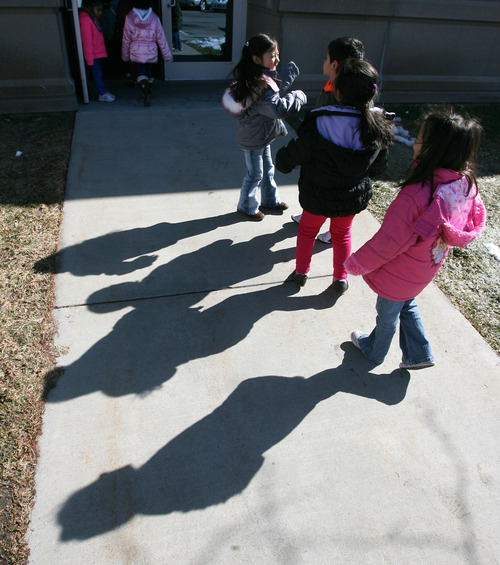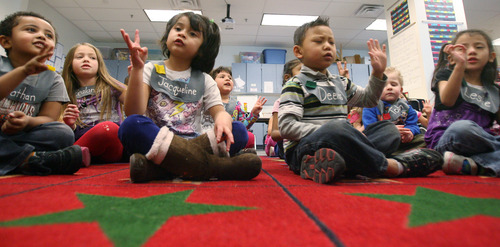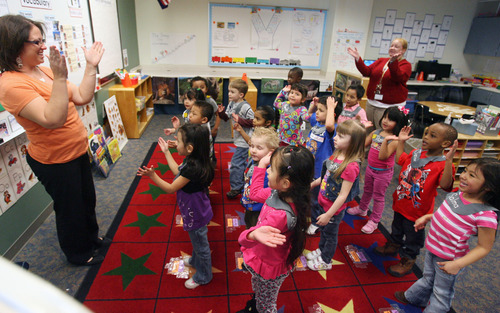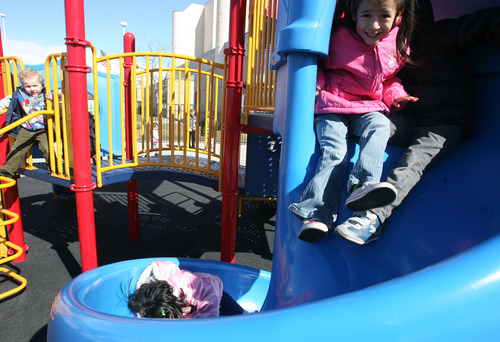This is an archived article that was published on sltrib.com in 2013, and information in the article may be outdated. It is provided only for personal research purposes and may not be reprinted.
Republican senators killed a bill Tuesday that would have expanded preschool for at-risk Utah children — criticizing technical aspects of the proposal rather than focusing on the longtime conservative argument that young children belong at home.
The bill would have sought $10 million from private investors to strengthen and expand high quality preschool programs for at-risk children. The state would have set aside $1 million a year to eventually reimburse investors with interest, but only if the program succeeded in helping kids advance and saving Utah money.
Bill sponsor Sen. Aaron Osmond, R-South Jordan, argued the programs would have been a win for children and the state. He said that data from a similar high quality preschool program in the Granite District showed many children could avoid expensive special education services later by attending preschool.
"We are already spending hundreds of millions of dollars to remediate this group … and it's not working and the cost on these children and their families is significant," Osmond said, adding it was time the state tried something new.
Several Democrats added their voices Tuesday to the chorus of supporters, which included the Utah Education Association (UEA), Utah PTA, the state school board and business leaders.
Sen. Patricia Jones, D-Holladay, said she'd received a number of e-mails in recent days both in support of and against SB71. She said the most offensive was an e-mail that claimed the bill would be a means for "illegal aliens" to get childcare.
"We are trying to close the achievement gap," Jones said. "These students will become our teachers, our doctors, our truck drivers, our technicians, our attorneys, our legislators … We are investing in our future."
Several Republicans, however, rose to poke holes in Osmond's proposal. Though some conservative opponents have argued the government shouldn't remove young children from the home, their objections Tuesday were centered mostly on the effort's design.
Sen. Margaret Dayton, R-Orem, criticized the bill for defining too many children as at-risk, despite assurances from Osmond that only certain categories of kids, such as those learning English, from low income homes or those who scored low on pre-tests would qualify.
She also said she worried that by partnering with private investors, the measure would lose transparency — although Osmond said the program would be subject to transparency laws because of how it would be overseen.
Finally, Dayton argued that trying to close the achievement gap is not "a noble goal," saying children should instead be allowed to learn at their own paces.
"I don't think we need any more intrusiveness into the decisions that parents have on this issue when we already have a number of programs available for people to choose from," Dayton said.
Sen. John Valentine, R-Orem, also expressed concern about whether preschool student data would be truly protected if the bill were to pass. And Sen. Howard Stephenson, R-Draper, questioned whether it would be possible to fairly measure the program's outcome.
On both counts, Osmond responded those questions could apply to many other education proposals as well.
"If we're going to have that level of scrutiny, which is absolutely appropriate," Osmond said, "we need to ask ourselves, are we expecting that same level of scrutiny on other areas of investment where we're spending millions of dollars on technologies and tools and other things without any kind of independent evaluation... on the results."
After the debate, Osmond attributed the bill's failure to misinformation, misunderstanding and pushback from groups such as the conservative Utah Eagle Forum.
A number of the bill's supporters expressed frustration after the bill died Tuesday, including UEA President Sharon Gallagher-Fishbaugh, who called it "disturbing" that anyone would oppose a bill designed to help children reach their potential.
"Children are the losers today … If there was a vendor attached to this bill, it likely would have passed, as we saw in the Senate Education Committee," Gallagher-Fishbaugh said. She was referring to committee approval on Monday evening of bills worth millions of dollars to fund educator evaluation software and modify a reading program, which some felt were written with specific companies in mind.
Opponents of the bill, however, cheered the outcome.
Kris Kimball, with the United Women's Forum, said plenty of options already exist for families and "we don't need the government involved at this level."
"There's always the risk that once you start implementing a program that's … targeting a certain group it pulls in the rest of the 3 and 4 year olds," Kimball said. "That's how kindergarten got started."
Osmond said several times during the debate Tuesday he did not support universal preschool. He said he isn't likely to bring the bill back this session, but would like to see it discussed further before the next session.









